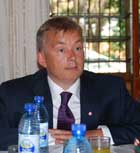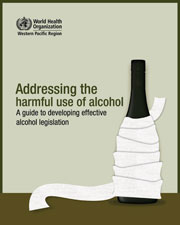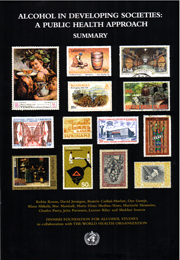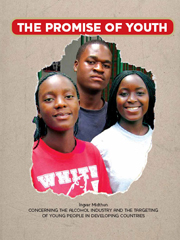
One man can!
Men can be mobilized to change men and harmful images of masculinity. Men can be a part of the solution! This was the optimistic message from Kenya and South Africa at a FORUT seminar in Malawi recently.
The roundtable on masculinity and engagement of men in changing gender roles was convened as a part of the program for the Norwegian Minister of Justice, Knut Storberget, during his visit to Malawi recently. Mr. Storberget has made the prevention of gender-based violence as one of his top political priorities, and by visiting Malawi ha wanted to study how this problem is being tackled in Southern Africa. The picture shows Mr. Storberget together with Philip Erick Otieno (left) and Regis Mtutu (right).
Regis Mtutu represented the South African organization Sonke Gender Justice Network at the roundtable. Sonke has, since it was established in 2006, developed a broad variety of strategies and program to involve men in changing men, in particular harmful aspect of the prevailing image of masculinity. – Masculinity as many seem to understand it, is not only harmful to women, it is also a danger to men themselves, said Regis Mtutu. He pointed in particular to how harmful male behaviour contributes to the “twin epidemic” in Sub-Saharan Africa; the combination of gender-based violence and the spread of HIV/AIDS.
Not a real man?
He said that many men are against gender-based violence, but they do not know what to do when they experience it in their communities. – They are afraid of being labelled weak or not a real man. In our programs we challenge this attitude and the behaviour of the participants. We show them positive alternatives. We train them to handle situations where they experience violence. And we train them in starting to care for others. When we meet with men in the communities we create a space where they can air their thoughts and worries, and our experience is that men are more ready to discuss and change than most people tend to believe, said Mtutu.
Dialogue men-women
The other invited expert to the round table was Philip Erick Otieno from Kenya. He works for Men for Gender Equality Now (MEGEN). They are building up a national core group of male supporters who believe in gender quality, men who are ready to stand up as role models and to go out and mobilize other males. Philip Otieno presented examples of the methods that MEGEN activists use when they visit communities; digital stories, theatre plays and posters. They also use a method called inter-dialogue sessions, where men and women are gathered to discuss gender roles, separately and together. These sessions are concluded with an exercise where both the men and the women are invited to define what they consider the ideal woman and the ideal man. – This is very often an eye-opener for the men, said Otieno in his presentation.
See the web site of Sonke Gender Justice Network here and the web site of MEGEN Kenya here.

A highly political issue
The Minister said in his presentation at the round table that there exists no excuse for violence against women, whatsoever. – For too long such violence has been considered a private matter and family business. This has to be changed. Domestic violence is certainly a highly political matter, a challenge for the whole community and a responsibility also for politicians. The issue has been raised by women and women’s organizations over a long period. It has taken time, too much time, for others to realize the problem of gender-based violence. Now it is time for action, and now the time has come for men to involve themselves, concluded the Minister.
Alarming statistics
The need for immediate action also from men was underlined by the statistics presented from South Africa and Kenya. South Africa has the highest rate of gender-based violence and rapes in the world. – Every sixth hours a South African woman is being killed by her intimate partner. Only one in nine victims reports rapes and less than 10 % of reported rapes lead to conviction, said Regis Mtutu from Sonke. Philip Otieno reported that figures from Kenya indicate that half of the women have experienced violence in their lifetime, and one in four reported violent experiences in the last 12 months in 2003.
- Eight out of ten women have experienced physical abuse in childhood and nearly half of the Kenyan women had experienced one or more incidences of sexual abuse. The Norwegian Church Aid in Malawi and FORUT are cooperating on a pilot project with the aim to mobilize men to change harmful gender roles, drinking habits and risky sexual behaviour. In this project lessons will be learned from organizations working with men in other countries in the region.
![]()
![]()
Developed with CustomPublish CMS by Nettinfo AS




